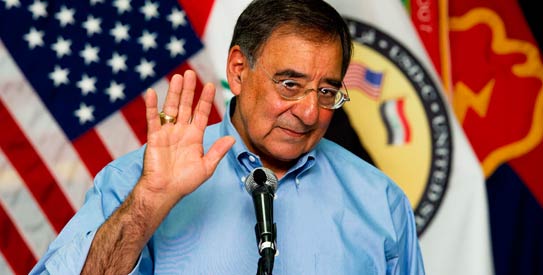
- US Defence Secretary Leon Panetta. - File Photo
WASHINGTON: US Defense Secretary Leon Panetta suggested that Iraq had agreed to keep American troops in the country beyond a 2011 deadline, but Baghdad insisted the issue was still under negotiation.
In an interview with two US newspapers published Friday, Panetta said the Iraqis appeared to have made up their mind to extend the presence of American troops beyond the year-end withdrawal deadline.
“My view is that they finally did say, 'Yes,'” Panetta told Stars and Stripes and the Military Times.
Iraqi political leaders announced on August 3 that they would open talks with the United States over a possible training mission after 2011 without saying definitively if some American troops would remain.
But the Pentagon later on Friday sought to play down the defense chief's remarks, saying he was merely noting that Baghdad was open to discussing a possible US military role.
“The secretary was asked if there had been progress in our discussions with the Iraqi government since his visit six weeks ago.
“He made clear that the Iraqis have said yes to discussions about the strategic relationship beyond 2011, and what that relationship might look like,” spokesman George Little said in an email.
Under the terms of a 2008 security agreement, all of the roughly 46,000 US troops still in Iraq must pull out by the end of the year unless both countries forge a new deal.
In Baghdad, the Iraqi premier's office said no decision had been made on the future of US troops.
“We have not yet agreed on the issue of keeping training forces,” Ali Mussawi, media advisor to Prime Minister Nuri al-Maliki, told AFP after Panetta's remarks.
“The negotiations are ongoing, and these negotiations have not been finalized,” he said.
The US military presence remains a delicate political issue in Iraq, and anti-US Shiite cleric Moqtada al-Sadr has warned of “war” if American forces stay beyond 2011.
Both US and Iraqi military officers, however, acknowledge Iraq's forces need outside assistance to defend the country's air space, ports and borders.
Panetta said Friday there was now a consensus among Iraqi leaders to address US concerns for the Baghdad government to hammer out what type of US training force would be needed, select a defense minister, draft a new security agreement and step up operations against Iranian-backed militants.
“So what I guess what I'm saying is we have made progress and as a result of that I think we're going to be engaging with them to try to negotiate what that presence will look like,” said Panetta, according to a transcript released by the Pentagon.
While there was no formal request on a training mission, the planned withdrawal of US combat troops by the end of 2011 will proceed, he said.
“We will fulfill the commitment that we are going to take all of the combat forces out of Iraq,” said Panetta.
“The issue will then will become what is the kind of training assistance and presence that Iraq feels it needs in order to be able to defend itself and secure itself.”
Shortly after taking over as Pentagon chief on July 1, Panetta voiced frustration in a visit to Baghdad, urging Iraqi leaders to “Dammit, make a decision” about a future mission for US troops.
US officials see a training mission as a way of helping build up the Iraqi government's armed forces while providing a peacekeeping presence that could defuse potentially volatile internal tensions.
Violence has steadily declined from a peak in 2006-2007 and US commanders have touted the trend as a sign that Iraqi security forces are capable of keeping the peace.
But al Qaeda-linked insurgents are still able to inflict bloodshed. The latest major attack on August 15 hit 18 cities, leaving 74 people dead and more than 300 wounded.
Although US officers believe al Qaeda in Iraq has been seriously weakened, they see Iranian-backed militant groups as posing a greater threat to security.
US officials allege the Iranian Revolutionary Guards Corps Qods force is providing direct support to militant groups, including weapons and intelligence.











































Dear visitor, the comments section is undergoing an overhaul and will return soon.